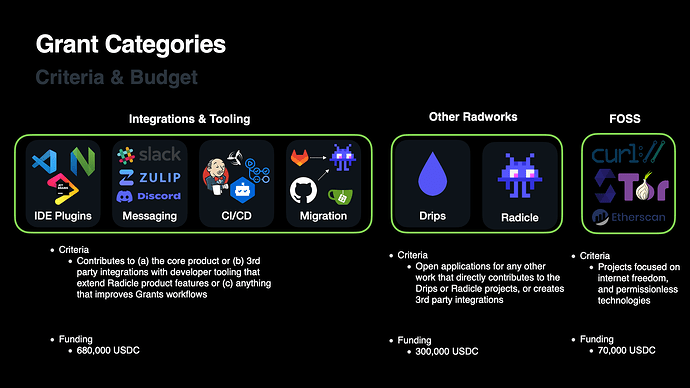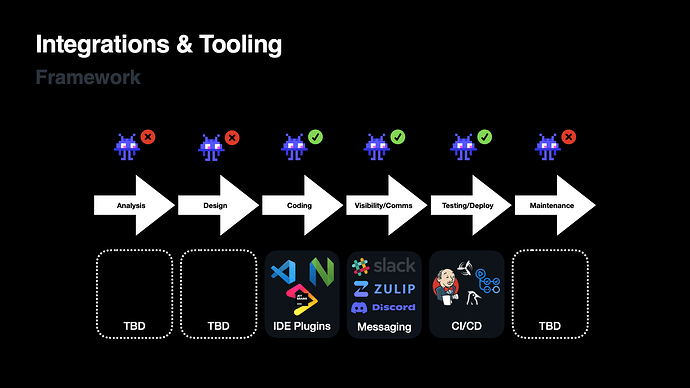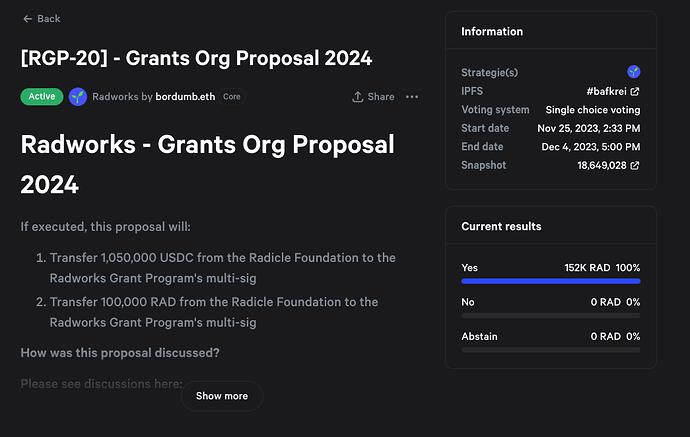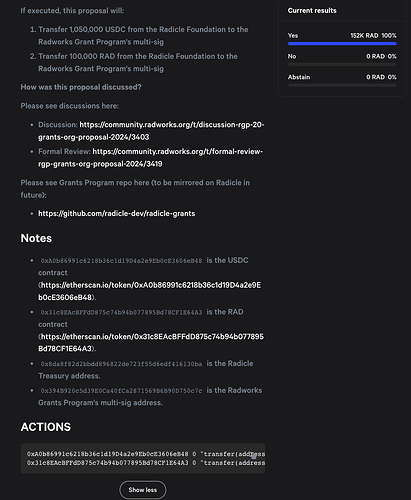Grants Org Proposal 2024
| Author(s): | bordumb, abbey |
|---|---|
| Type: | Org |
| Created: | 2024-11-06 |
| Discussion Post: | [Discussion][RGP-20] - Grants Org Proposal 2024 |
| Status: | active |
This is the official Formal Review draft for RGP-20. Please formally review the proposal and vote in the Snapshot poll by
17:00 CET - Monday, November 27th
!
Purpose
The purpose of this proposal is to elevate the scope of Grants as the main body that manages the technical funding behind Radworks’s broader mission:
Radworks is a community dedicated to cultivating internet freedom. In a world that almost entirely relies on software, maintaining the resilience and health of the free and open source ecosystem is more important than ever. We strive to demonstrate the viability — in cost, labor, quality, and resiliency — of open-source software and its development. (1)
The Radworks Grant Org’s (Grants) goal is to fund projects focused on censorship resistance, internet freedom, and permissionless technologies. This includes third-party integrations & tooling (IT) specific to Radworks technologies and general open-source projects.
Our Grants budget is 1,050,000 USDC.
64% of our budget is dedicated to Integration and Tooling (IT) Grants and 24% of our budget is dedicated to FOSS Grants. The remaining 11% will be allocated on an ad-hoc basis to fund any other projects that directly contribute to the Radworks ecosystem (Drips and/or Radicle).
Strategy & Roadmap
Previous Grant proposals have been specifically focused on supporting the development of Radicle and Drips. Now, in line with Radworks’ newly formed purpose, the Grants Org aims to expand and broaden its scope to FOSS funding, while setting clearer & more precise goals.
The 3 main areas of focus are below.
Integrations & Tooling
Integrations & Tooling Grants are born out of our long-standing relationship with Yorgos’s team – a community contributor who has worked on previous grants, such as IDE plug-ins for VSCode and JetBrains. Their focus has and will continue to be on integrating Radicle with external developer tools. The main goal is to lower friction for developers who want to integrate Radicle into their existing workflows.
The plans below are tentative, however, there are cases where any of these projects might be dropped in favor of more urgent ones. For example, in cases where we are onboarding a community, they may be blocked by some missing feature. The team will move plans around accordingly to help in these cases.
Note: The list of projects below are ranked based on importance and whether or not they have a technical dependency on Radicle v1.0, which is a risk we want to mitigate.
Budget
The total budget is estimated at 680,000 USDC
Note:
The budget is not necessarily guaranteed.
- The grantees will still have to write up quarterly applications that provide specific milestones and updates on current progress.
- Approval of these applications will still be at the discretion of the Grants committee.
- The reason for earmarking this budget is to put this work in a solid position to allocate labor towards tools that we feel are essential for onboarding new users.
While we are allocating financial capital, we are also allocating human capital. Having this budget set aside will make sure that the people working on it have better confidence and ability to be full-time with the work, rather than haphazardly coming and going.
IDE Plugins
IDEs are where most developers start writing their code and locally, where they do most of their organization of work. It is crucial to have plug-ins with the most popular IDEs so that developers feel comfortable integrating their existing workflows into the Radicle ecosystem. Without this, Radicle becomes a tough sell.
Success Criteria:
- Work with issues and patches within IDE
- Integration with Radicle 1.0 across JetBrains and VSCode plug-ins
Stretch Goal:
- Look into Neovim plugin (Cloudhead proposal)
Estimates:
- IntelliJ: 5-6 months, 80K
- VSCode: 6-9 months, 190K
We have already funded work on plugins for the 2 most popular IDEs (VS Code, Jetbrains IDEs), and in 2024 we want to reach a “1.0” version for each one. VSCode work was started significantly later than JetBrains, so needs more development to catch up, hence the larger budget.
V1.0 dependency: this project does not have any significant dependency on Radicle v1.0
IM tool integrations
Instant messaging tools are where developers spend most of their time collaborating in real-time, especially in remote, asynchronous teams. Whether they are open source tools like Zulip, or closed-source like Slack and Discord, they serve this same purpose. Integrating with IMs – with features like notifications on new Patches, comments, and @mentions – will allow teams to stay in-synch more easily. Without this, teams will continue having more friction staying on top of updates in their Radicle repositories.
Success Criteria:
- Integrate with Zulip and dog-food
- Integrate with Slack/Discord
Estimates
- 6-8 weeks
- 60K
V1.0 dependency: this project does not have any significant dependency on Radicle v1.0
Migration Tooling
Migrating an entire project from somewhere like GitHub introduces a significant hurdle. By creating migration tools, we can lower the overhead and make it that much easier for teams to migrate their projects. Without this, the task is daunting and may be too high a hurdle to convince teams to switch tooling to Radicle.
Success Criteria:
Estimates
- 4-5 months
- 160K
We have already funded basic research and development for GitHub issues.
V1.0 dependency: this project does not have any significant dependency on Radicle v1.0
CI Integrations
Continuous Integration (CI) is the go-to paradigm for ensuring that code is properly tested, verified, and built. By adding CI tooling, we will ensure that one of the most important steps in software development workflows is integrated with Radicle. Without this, migrating to Radicle is a harder sale.
Success Criteria:
- Jenkins
- Dependabot
- Quay.io (Artifactory)
Estimates
- 5-6 months
- 190K
We have already funded basic research and development for CI integrations.
V1.0 dependency: this project does have a significant dependency on Radicle v1.0. Thus, we have listed it last. There may be nominal work in the beginning of the year, however, if there are any delays with v1.0, this project can and will be pushed out later.
Funding Analysis
The Integrations & Tooling team consists of 4 full-time, including 2 senior developers, and 3 part-time members. Comparing to our Core teams, this is roughly 3/5 the size, for 1/3 the cost. Comparing to industry, it is also a very reasonable (source: levels.fyi), where the budget would likely range between 650-750K.
Other Radworks
We are allocating 300,000 USDC for open applications for any projects that contribute to either:
- Contribute direct improvements to Drips or Radicle
OR
- Build 3rd party integrations with either Drips or Radicle
Contrasting with IT Grants, we do not have any specific projects in mind for this category.
The success and refined focus of the IT Grants is a testament of what can happen by setting aside budget for open applications.
We believe that having this budget set aside will allow us to be in a position to take open applications, as well as actively recruit teams for retroactive and proactive funding.
Funding
This funding may be retroactive funding (i.e. paid out after a product is already finished) or as proactive funding (i.e. paid out before work is started).
In the event that we fund something retroactively, we will pay out via Drips as a short-term drip for the amount paid out (e.g. 10,000 USDC streamed over a month).
In the event that we fund something up-front, we will follow the same payout method as previous Grant rounds (i.e. total amount of USDC dripped over the timeline, per milestone).
FOSS Grants
The primary goal for FOSS Grants is to fund projects focused on censorship resistance, internet freedom, and permissionless technologies. These will include projects that are outside of the Radworks ecosystem.
Funding
The focus on funding will be FOSS projects that enable censorship resistance, internet freedom, and permissionless technologies.
This will include projects that deliver enhancements to the broader FOSS ecosystem, including but not limited to programming language libraries, package management systems, open-standard communication protocols, and tooling for privacy. It is important to note that our funding is not allocated towards the initial proof of concepts (POCs).
This budget may be used for retroactive funding, such that funding is targeted to proven technologies. We will also allocate funding to brand new projects.
We will both actively seek out grantees (proactive) and passively welcome inbound requests for grant funding. However, our primary focus for 2024 will be to grow our muscle in actively searching for and nurturing software projects from the ground up.
As part of this, we will aim to onboard any project we fund to Drips so that we utilize that infrastructure for funding. Onboarding will include asking each project to setup their own Drip List. We will also work to onboard projects to Radicle.
We estimate this will require 70,000 or 7% of the budget.
Outreach
We will allocate some portion of this budget for outreach with open source communities. This may include going to open source conferences and meetups.
We estimate this will require 3,000 or 0.3% of the budget.
Organizational Structure
The Grants committee includes all members of our Gnosis Safe multi-sig, found here.
Current Members
In alphabetical order:
- Abbey (Radworks)
- Bordumb (Radworks Community; Lead)
- Jenny (Exonumia cofounder; tentative, to be voted in)
- Nader (Aave/Lens, DevDAO founder)
- Nas (ex. Safe, ex. Radworks)
Member Responsibilities
- Reviewing Applications: reviewing applications in detail. If a committee member does not understand something, they are expected to be resourceful in learning or finding outside council on a topic.
- Reviewing Milestones/Completions: reviewing milestones/completed work in detail. If a committee member does not know something, they are expected to be resourceful in learning or finding outside council on a topic.
- Multi-Sig voting: participate in voting on and funding grants.
- Meetings: most work will be done asynchronously, but committee members are expected to actively participate on Discourse, community, and governance calls.
Membership Terms
If a member fails to actively participate in voting, they may be removed from the committee. As this is all on-chain, it will be a fairly straightforward process. For now, we will expect members to evaluate and vote on at least 1 grant per 3 months. If there is no grant to be voted on, this will not apply for the 3 month period. Members may abstain from a vote, but must publicly declare their abstention.
The rules above will apply retroactively for 2023 voting, and will effective immediately upon approval of this proposal.
If a member is found in violation of our community guidelines, they may be removed from the committee.
Communication
Applications
Grant applications are the primary documents that outline what is being worked on.
You can find more info on Discourse here: https://community.radworks.org/c/grants/24
Repos
All of our long-term documentation, including various templates (proposals, grant applications, RFPs, etc.), as well as organizational structure can be found in our repos below.
- Radicle: TBD
- GitHub: https://github.com/radicle-foundation/radworks-grants
Reporting
The Grants lead (Bordumb) regularly gives updates in all Community Calls.
The Grants lead regularly gives written quarterly updates. The latest can be found here.
Stand Ups
Bi-weekly.
Reasoning & Analysis
FOSS Grants
FOSS Grants is set to back initiatives aimed at bolstering anti-censorship, promoting internet freedom, and nurturing the growth of permissionless tech. This support isn’t just for projects under the Radworks umbrella; we’re looking to fuel innovation in the wider FOSS space. Our funding is geared towards those ready to create a web that’s resilient and free from undue restrictions.
Our grant-making philosophy draws inspiration from the likes of Sovereign Tech Fund (STF) and the Electronic Frontier Foundation (EFF), with a track record of catalyzing change through both substantial and highly specialized grants. A great example from STF are their grants targeting tooling within coding ecosystems, specifically targeting single repositories for funding (e.g Python Security Library Grant). We’re aiming to emulate this funding model, aiming to strike a balance between substantial contributions to large-scale projects and pinpointed funding.
As for the allocation of our resources, we’re taking a page from sentry.io’s playbook. Their incremental approach began with an initial funding pool of around $70,000, methodically nurturing their program to greater extents over the years (2022 program, 2023 program). We’re setting off on this journey with a similar initial funding, determined to expand and evolve our funding initiatives to scale up the support for open-source grants progressively.
Integrations & Tooling
The primary goal with Integration & Tooling (IT) grants is to cover key integrations for Radicle code collaboration. These include integrations across the typical software development stack.
Starting from writing code in IDEs, to instant messaging for teams, continuous integration/development (CI/CD), these grants are aimed at making it easier for developers to plug Radicle into their existing workflows.
Essentially, the aim is to make sure we have integrations across each part of the software development life-cycle, as shown below. So far, we are focused on the most basic components around Coding and Deployment of software.
Each tool we integrate with is generally prioritized by a combination of market share.
Reporting & Success Criteria
Through Q2 2024, the Foundation Org will provide monthly financial reporting to Radworks on behalf of the Foundation, Radicle, Drips and Grants Orgs. Therefore, starting in Q3 2024, the Grants Org will publish monthly financial reports on Radworks-granted funds spent by the Grants Org .
FOSS Grants
Operational
- Contributor Growth: measure the growth of contributors to each project. Gaining contributors is a strong signal that a project is of interest to developers.
- Project Legitimacy: we will aim to onboard key FOSS projects (of the likes of
curl://or Tor) to accept Drips. - Funding Variety: measure the diversity of project types and sizes to ensure a broad impact. We should aim to cover projects that touch most, if not all, of Radwork’s Foundational Beliefs.
Technical
- Onboard 100% of FOSS teams to accept payment via Drips
- Onboard 100% of FOSS teams to Split their incoming Drips
- Onboard 100% of FOSS teams to use Radicle
Integrations & Tooling
Technical
- 100% of new features delivered
Operational
- 100% of tools tested by users
- 100% of tools get feedback from users
- 100% of grants paid out via Drips
- 100% of code delivered via Radicle
Retrospective
Timeline & Budget
All costs will be spread out over 2024.
Grants
1,050,000 USDC
Committee
100,000
Fund Management
The Grants Org - also the “Grant Recipient” of Radworks, if this proposal is passed - hereby agrees to use the amount granted by Radworks in support of fulfilling the purpose outlined in the “Purpose” section above. The Grant Recipient understands and acknowledges that the awarded amount may be used only for this Purpose. Furthermore, any part of the grant that goes unused in the calendar year outlined in this proposal (for 2024) will either be returned to the Radworks Treasury (by March 2025) or rolled over into and applied towards the Org’s 2025 proposal and future grant from Radworks.
Assets
All assets will reside in one of two locations: Gnosis Safe or Drips. These will be used both for paying grantees and committee members.
Any remaining assets will roll-over into the 2025 budget.
Gnosis Safe
Link: https://app.safe.global/balances?safe=eth:0x394B920c5d39E0Ca40fCa2871569B6B90D750c7c
Drips Account
Link: https://www.drips.network/app/0x394B920c5d39E0Ca40fCa2871569B6B90D750c7c
Risk Management
Paying for Grants work is inherently risky. We do not know which projects will succeed in delivering work.
However, luckily with Drips, we can pause and completely stop Streams at will. In the event that a Grantee needs to pause work or stops working entirely for any reason, we will be able to either pause or stop the Stream.
Retrospective
Please see 2023 retrospective here: Grants Org Retrospective 2023



